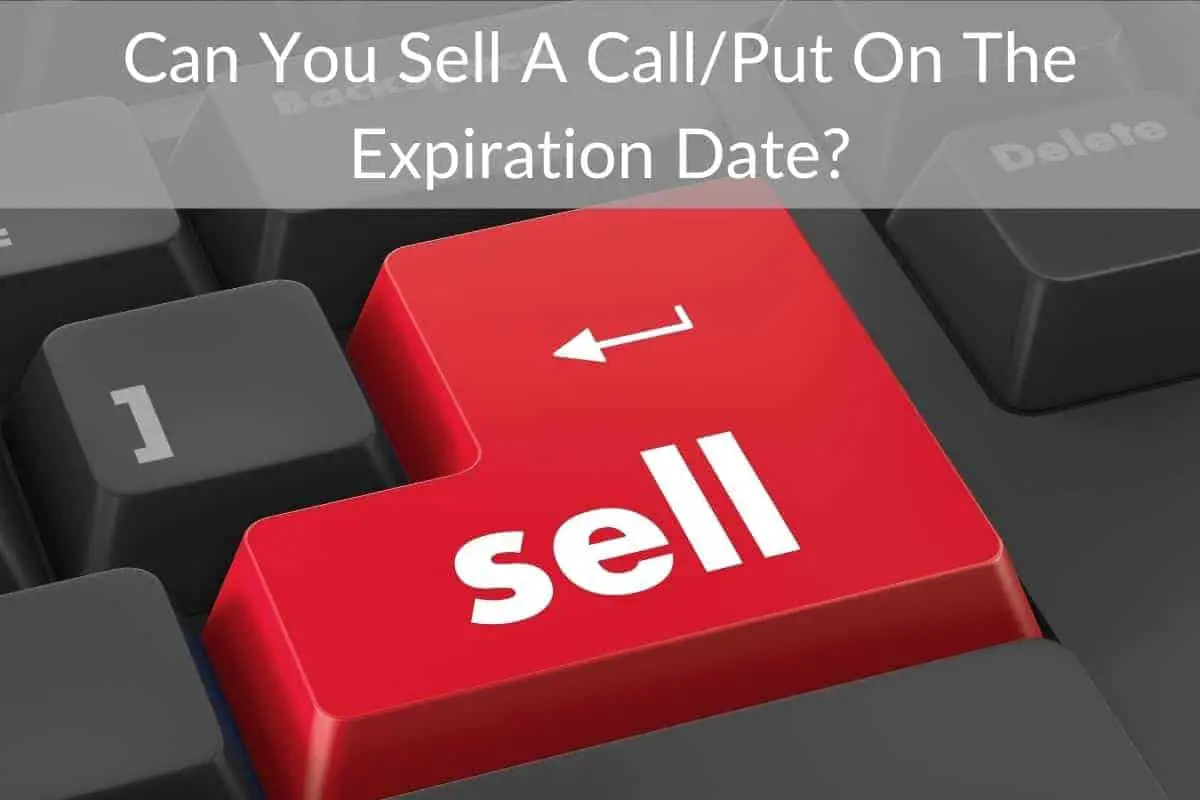Table of Contents
*This post may contain affiliate links. As an Amazon Associate we earn from qualifying purchases.
An option contract is void on the expiration date, but many investors look for ways to salvage value from the contract, especially on the expiration date or close to it.
Is it possible to sell a call or put a contract on the expiration date?
You can sell a call or put a contract on the expiration date or you can exercise it (if you prefer). Some brokers will automatically exercise (or sell) a call or put on the expiration date though so it’s important to know if your broker does that and when they will before trading.
For example, Robinhood (the popular brokerage app) will automatically sell a put or call option that is in the money forty five minutes before the market closes on the day of expiry (if you don’t have the funds to exercise the option).
This is to prevent you from accidentally holding the call or put that is in the money and losing its value by not doing anything before it expires.
If you are unaware of this rule for your brokerage it may automatically sell your put/call and prevent you from making additional money during that time prior to the market closing. Be sure to contact your broker to see if they do this and if so when they will sell an in the money option on the expiration date.
In the rest of this article I will look at some of the choices you have on your options expiration date.
The Main Methods For Exiting Options
There are three main methods for exiting any options position.
- Buy or sell the position (contract) to close it.
- Ignore the contract if it’s out of the money.
- Exercise the option and trade the underlying stock if it’s in the money.
For most small traders the first and second options are by far the most popular. If your call or put option is in the money then most small traders will choose to sell it rather than exercising it as they won’t have the funds to buy (in the case of the call) or the shares to sell (in the case of the put).
So that trader will simply sell the call or put on the open market prior to the close of the stock market on the expiration date.
If your call or put is out of the money on expiration (and it isn’t close to the strike price) then it will have virtually no value (especially as the market nears closing) so you can just let those options expire worthless.
However if that call or put us close to the strike it might be worth something at the start of the day and then increase (or decrease) in value depending on that stock’s movement throughout the trading day.
It’s important to note that you don’t have to wait until the expiration date to sell (or even exercise) your call/put. Interestingly, many traders sell or buy options contracts to close the position long before they expire.
According to the popular options expert Michael C. Thomsett, 60% of all options positions don’t reach the expiry date.
That’s not a surprise when you consider that he also mentions that 75% of options held to the expiry date expire worthless. So, it means that most traders will sell or exercise their call or put if it’s in the money before the expiration.
However, you can also choose to sell any option that’s not going in your favor and take a loss on the premium you paid instead of losing everything when it expires worthless.
How To Determine the Value of Your Contract Near Expiration
Your call option doesn’t have much inherent value if the underlying stock is trading below the contract strike price near or on the expiration date. On the other hand, a put option has no inherent value if the underlying stock is currently trading above the strike price on expiry.
In both situations, the option is out of the money and will expire worthless if you allow them to reach the expiry date. If you choose to sell the contracts before then, you’re likely to get back a fraction of the premium you paid (depending on how volatile the stock and market is).
The exact amount will come down to how deep out-of-the-money the contract is at the time and the distance to the expiration date.
On the other hand, if the underlying stock is now trading above the strike price on a call option, it is in the money and has inherent value. The same applies if the underlying stock in a put option is currently trading below the strike price.
In both scenarios, you can make either of two moves as the expiration date nears.
You can either sell the options contract and cash out the value or exercise the option. If you choose to exercise the option, you’ll have to buy the shares of the underlying stock (for call options) or sell the shares if you’re holding puts.
Here’s an illustration.
Wayne pays $4 for a $180 call option on stock AAA. With one options contract representing 100 shares, Wayne has to pay $400 for this position. A day before the expiry, stock AAA now trades at $200, which means the call option now has intrinsic value of the difference between the strike price and the new stock price is ($20).
Wayne can choose to sell the contract for a profit of $1,600 ($20 x 100 shares-$400 cost). On the other hand, he can decide to exercise the option and buy AAA shares instead. To do this, he’ll need to pay $18,000 ($180 exercise price/strike price x 100 shares).
Since the stock price is already trading at $200, Wayne is instantly sitting on $1,600 profit ($20,000 current price for 100 shares-$18,000 cost for exercising at the $180 strike price, and $400 paid for the options contract).
When exercising or selling a call or put that is in the money you will often make the same amount of money (as evidenced in the example above). That is why many people choose to just sell the call/put instead of exercising it.
Important Details To Keep in Mind
Remember, you can only decide what to do only BEFORE the end of day on the expiration date. At the end of trading on the expiration date, your out-of-the-money options will expire worthless, while your in-the-money options will get exercised automatically or sold (depending on your broker).
However, some brokers may not exercise the option contract automatically after the expiry date if you instruct them not to do so.
Such brokers may also have different rules on how to lock in the profit on contracts with inherent value. Therefore, the surest way to know what you’re allowed to do and what you can’t do with any broker is to get in touch with them.
You should also keep in mind that different options have different rules on when you must exercise them. While standard American options can be exercised at any point from purchase to expiry, European variants can only be exercised at the expiry date.
Bermuda options allow a mix of both.
If you trade a mix of options, you have to pay attention to the rules surrounding their expiry and ensure you make the best decision for each contract. For example, having your options sold automatically when the stock is in the middle of skyrocketing near the close of the market on the expiration date can really hurt your profits.
Final Thoughts
You can sell a call or put an option on the expiry date however sometimes a broker will sell or exercise them automatically (so make sure to know if and when your broker does this for in the money options).
If you’re sitting on a contract that’s in the money and you intend to sell, it is best to decide on your course of action no later than the final trading day before the specified expiration date.
That will allow you some time to make a decision rather than having to decide quickly as the expiration time looms over you.
You may also choose to sell contracts that are out of money to recover some of the premium paid. Like in-the-money contracts, that decision should also be taken well before the expiry date.
Otherwise, you’ll only recover a few dollars, if you’re lucky now the expiration date.

